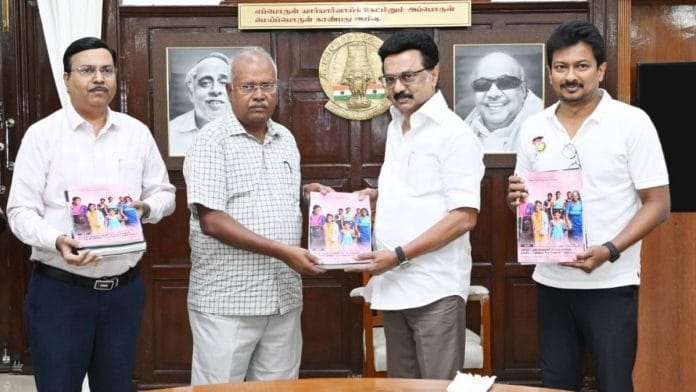Chennai: The Tamil Nadu State Planning Commission (SPC), in its report on the start-up ecosystem in the state, has advised the government to consider adopting policies from Gujarat, among other states such as Odisha, Kerala and Karnataka.
The 270-page report titled ‘Start-up Ecosystem in Tamil Nadu: Opportunities and Challenges’, prepared by the Centre for Research on Start-ups and Risk Financing, IIT Madras, in collaboration with the SPC, was submitted to Chief Minister M.K. Stalin Tuesday.
While the report praises the state government for its “Dravidian model of equitable growth”, it also calls for stronger regulatory clarity, funding access and awareness among start-up founders. ThePrint has a copy of the report.
The report recommends that the state consider adopting well received schemes in other states, including Gujarat.
“Schemes that have been well received in other states could be considered for adoption in Tamil Nadu. Examples include Gujarat’s support for start-ups navigating the ‘Valley of Death’ stage, Odisha’s provision of grants at different development stages, including monthly allowances, especially for minorities, or Kerala’s support for distressed start-ups,” it reads.
Gujarat supports startups navigating the “valley of death” through the Pre-Series A Funding component of its umbrella ‘Scheme for Assistance for Startups/Innovation’ under the Gujarat Industrial Policy 2020.
“Some of the best practices of other start-up policies that can hold relevance for Tamil Nadu would be: Gujarat’s emphasis on Regulatory Reforms with a thorough governance model, Karnataka’s focus on Environmental Sustainability, and Kerala’s approach towards ensuring Start-up Sustainability, including accommodating failures through distress funds and facilitating smooth winding up of operations under adverse conditions,” the report’s executive summary reads.
According to the report, Gujarat leads in regulatory reforms by creating a tier-system for governance within its start-up ecosystem, consisting of four governing bodies: State Level Apex Committee (SLAC), Policy Implementation Committee (PIC), Gujarat Knowledge Society (GKS) and Project Management Units (PMUs).
“The detailed focus on monitoring and evaluation at various levels of the system ensures that the provisions established for the start-ups are well received by deserving candidates,” the report points out.
While benchmarking Tamil Nadu’s Start-up and Innovation Policy 2023 against those of five other states—Gujarat, Kerala, Karnataka, Maharashtra and Odisha—the report finds that Tamil Nadu “leads in seven out of nine major policy themes analysed”, including funding and finance, market access, infrastructure, skill development, and equitable growth.
However, it says Tamil Nadu “lags in regulatory reform and sustainability”, areas where “Gujarat, Karnataka and Kerala demonstrate superior practices”.
According to the report, Tamil Nadu’s start-up policy is the most comprehensive, with 283 initiatives.
“The state excels particularly in equitable growth provisions, reflecting its Dravidian Model philosophy through targeted support for SC/ST, transgender, and differently-abled entrepreneurs,” the report reads.
It credits the state’s flagship StartupTN Mission, set up in 2021, for the rampant growth of entrepreneurship in the state.
“As of July 2025, there have been more than 11,900 start-ups, 5 unicorns, 24 IPOs, and 228 incubators and accelerators in Tamil Nadu. The setting up of StartupTN has provided the necessary fillip and focus for creating a vibrant start-up ecosystem in the state,” says the report.
Also Read: Why a report by Stalin-appointed panel on state autonomy may trigger fresh Centre-TN faceoff
‘Fragmentation weakens outcomes’
The report points to fragmentation across various departments that weakens outcomes.
“The nodal Tamil Nadu Start-up Policy has been implemented by the Department of Micro, Small and Medium Enterprises. However, the subject of start-ups also finds mention in the policy agenda of several other ministries and departments, indicating the primacy given to start-ups in the state government’s policy agenda,” it states.
It cautions that “fragmented implementation across multiple departments creates duplication and dilutes accountability.”
The report recommends a single-window system to “centralise start-up policy delivery and ensure efficiency in monitoring”.
According to the report, among the 11,900 registered start-ups in the state, manufacturing, healthtech, agri-tech and food sectors have seen significant traction, with five unicorns emerging from Chennai alone. Yet, only 5% of start-ups access angel funding, 4% venture capital, and just 30% are registered on the Government e-Marketplace for procurement.
The report also points to the gender disparity in grant of funds to start-ups.
“Significant gender disparities exist across all funding categories, with male founders receiving 84-94% of funding, though female founders show slightly higher representation in state government funding at 16%,” it underlines.
The report also flags the gap between awareness of flagship events among the startup founders and participation of the start-ups in such events.
“Despite strong awareness of flagship events like Startup Tamizha and Startup Thiruvizha, where 71% and 70% are aware of events, only about one-fifth of informed start-ups actively participate.”
Despite these gaps, it lauds Tamil Nadu’s “Dravidian model” of inclusive entrepreneurship.
“Tamil Nadu’s start-up policy excels in equitable growth provisions, reflecting the government’s Dravidian Model political philosophy. Separate funding schemes for start-ups led by SC/ST youth, trans people and the differently-abled highlights this focus,” it states.
(Edited by Nida Fatima Siddiqui)
Also Read: Tigers of the skies finally get a govt boost. Tamil Nadu unveils Raptor Research Foundation






